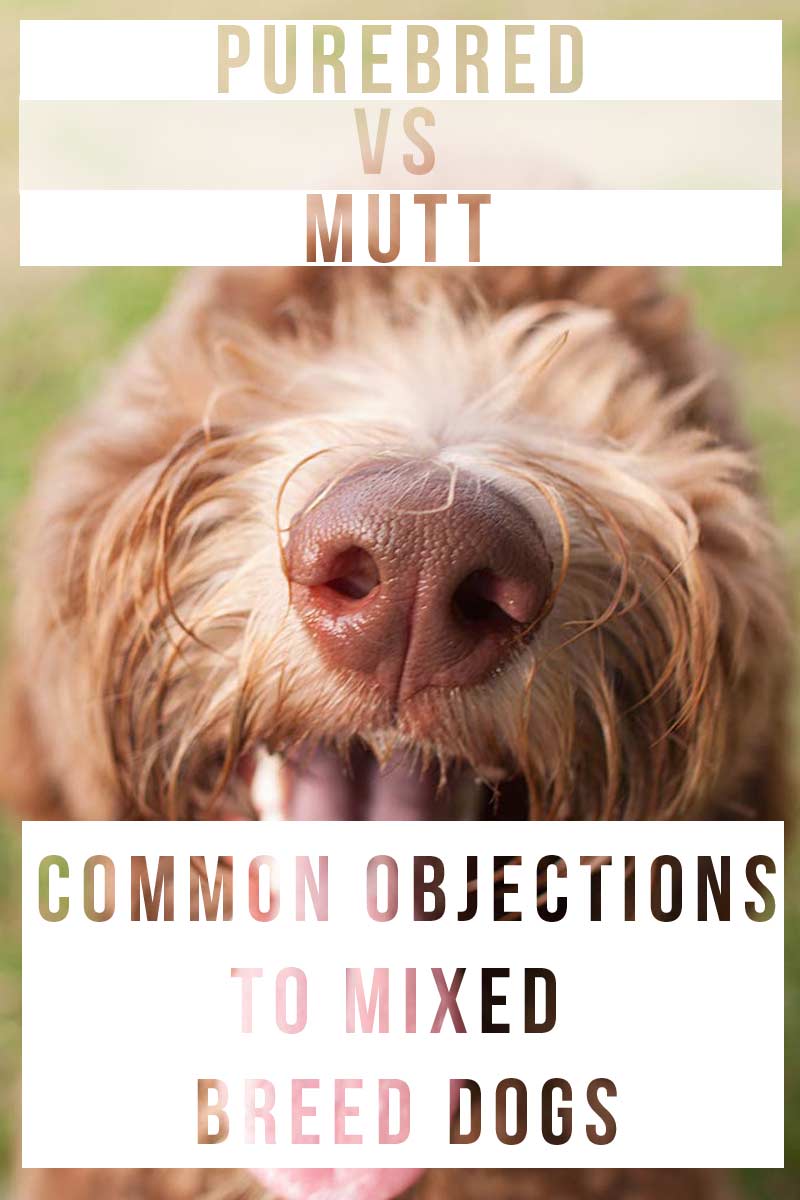We’ve been listening to the growing debate in our online community about mixed breed dogs. Purebred Vs Mutt – which is better. Feelings run high on this one, and as we’ve been covering a number of popular Labrador cross breeds in our mix breed review series, we’ve come across a range of objections to mixed breeding. We’ve taken a look at them below.
We hope you find them interesting and do feel free to add any new objections, information or indeed support, in the comments section below. Or on our facebook page. It’s a good idea to check out our chat guidelines first if this is an issue you feel strongly about. You can find an in-depth guide to mix breeding and a fuller explanation of many of the points below in our guide: Mixed Breed Dogs.
Here are the most common objections – we’ll add to them if more come to light
1 Mutts are over priced – it’s all about money
Many people object to the high price of some mixed breed puppies. And feel that pedigree puppies should always cost more. The whole price argument is to some extent a diversion. It is the welfare of the puppies that counts, not the amount of money in their breeder’s bank account. But let’s address it anyway!
One of our readers said “these dogs are not recognised as pure breed and should not achieve a pedigree price” This assumes that a pedigree certificate has some intrinsic value. This might be the case if a pedigree certificate was an indicator of health or longevity. But currently it isn’t.
Breeds that become fashionable all tend to fetch high prices. This is true of both purebred and mixed breed dogs. French Bulldog puppies for example are often sold for $4000 and more.
Usually we expect to pay more for things which are more valuable, and many people think that a pedigree certificate offers value in terms of a guarantee of certain health standards. Unfortunately this is currently not true. The flattened face of French Bulldogs, Bulldogs, and Pugs for example means that many of these puppies will suffer from Brachycephalic Obstructive Airway Syndrome, may need major surgery and spend a lifetime struggling to breath. This is not a feature that adds value to most people’s lives.
Consider also that pedigree certificates in the USA are still issued to puppies whose parents are inbred (brother to sister matings for example) In the UK we have now banned this practice yet we still give out pedigree certificates freely to puppies whose parents do NOT have any of the recommended health clearances OR that have taken health tests and failed them!
The value of a puppy should be related to health and welfare issues not to whether or not both its parents are registered on the same list of dogs, and meet a standard designed by humans that in some cases are not even capable of recognising that a dog needs a muzzle in order to cool itself and breath efficiently, a set of legs long enough to run around and jump without slipping a disc and enough genetic diversity to avoid being riddled with inherited diseases.
The fact that people still breed damaged purebred puppies with conformational defects built into them is an international tragedy. Any concerns about whether or not people should be allowed to cross a Labrador with a Poodle are really insignificant in comparison. For example, how can a sickly bulldog that stands to live an average of six years, while struggling to breath, be worth more to a puppy buyer than than a Labrador Collie mix with a life expectancy of 12-14 years or more of good health.

Puppies are expensive to raise, and as more mixed breed puppy breeders now health test their breeding stock (a great step forwards) expensive to produce too. The stud dog fee for a pure bred parent is also likely to be the same (if not higher) in a mix breed mating. And health tests cost exactly the same no matter how pure the parentage of the dog.
Finally, this assumption assumes that pedigree dog breeders are not ‘in it for the money’ and are producing puppies from the goodness of their hearts. Also not true, at least not for all.
Mixed breed dog breeders don’t have a monopoly on inflated prices, they exist for any breed or cross breed that becomes popular. French bulldogs are a prime example. While breeding an occasional litter responsibly is rarely a profitable venture, it is perfectly possible for a purebred dog breeder to turn out litter after litter for a good profit, and many do. So until the world’s major kennel clubs put their pedigree house in order, and start imposing real health standards on their breeders, it is likely that more and more people will reject their values
2 Purebred Vs Mutt – Cross breeds come from puppy mills
This is another false assumption. Along with the assumption that pedigree puppies all come from reputable breeders. Again, not true. There are plenty of puppy mills churning out pedigree puppies. And plenty of mixed breed puppies are born in loving family homes or produced by caring, responsible breeders. We should be campaigning for all puppies to be responsibly bred, not just those with a certificate to say the AKC has registered them.
3 People who buy mix breed puppies need educating
There are some people who buy mix breed puppies that are ignorant of good puppy selection protocols. Just as there are some people who buy pedigree puppies that are ignorant of good puppy selection protocols.
Many buyers of mixed breed puppies are far from uneducated however. In fact, many veterinarians and biologists believe that public need educating about the risks of buying purebred puppies. And that the people who need educating the most, are those that are breeding purebred puppies on a day to day basis.
4 It’s Pedigree Vs Mutt – stop giving them fancy names!
A very common objection here on the Labrador site is the creation of nicknames for breed mixes. Those who object to a Boxer Labrador mix for example, feel much more upset if others refer to the mix as a Boxador. Some readers have commented that designer dogs should never be given names as they feel that it somehow glorifies or promotes them.
There are over 400 pure bred dog breeds, but these breeds are a human construct. They are not different species, and did not evolve naturally. We created them, then made lists of them, gave the list a name (eg Labrador Retrievers) then said that no-one could put their dogs on any of the lists unless that dogs’ parents were both on the list too. That is all that purebred means. It is a dog on a list. We kept separate lists for dogs that were similar in appearance and that performed the same role. Over time we have become more concerned with the appearance and less concerned with the role.
Modern mix breeders are doing what our ancestors did. Experimenting with different mixes to see what happens. Until the point when the lists or registers were closed, a relatively short time ago, cross breeding between different breeds was common place. Closed registers or purebreeding is a fairly modern concept and one that many biologists and veterinarians believe will have devastating consequences to the dogs we love. And it’s worth remembering that if our ancestors had not enjoyed mixing different breeds together and (gasp) giving those new mixes a new name, we would not have the breeds we now have today
5 Mixed breed puppies are less healthy
There is a great deal of confusion over the health issues. A puppies health is mainly dependent on two factors
- Genetic makeup
- Environmental conditions
The argument that mixed breed puppies have an unknown health history, or unknown temperament is simply not an assumption that can be applied to the entire population of mix breed dogs. It is also true of many purebred dogs.
What is worse, many purebred dogs have been deliberately bred with health defects as a part of their conformation. And have a terrible genetic makeup due to inbreeding. And yet those same breeders are trusted by unwitting puppy buyers because of the ‘pure bred’ tag
6 Dogs have enough problems without adding hybrids into the equation
Hybrid dogs are not causing problems for our four-legged friends. The sad truth is, that far from being the problem, hybrids may now be the only way to save many of our beloved pedigree breeds because those breeds have become so in-bred. As Dr Kohorik Arman from the Vancouver Animal Hospital had to say in 2007
“The wide array of genetic diseases found in purebred dogs reflects their unnatural development, by kennel club associations and breeders who are largely responsible for this welfare predicament”
I once felt a strongly as many pedigree dog fans feel today about pure breeding. So I understand the emotional attachments and strong feelings. But I listened to the evidence and I changed my mind. The evidence is out there for all who are willing to listen. And there is far more of it now. For those that wish to learn about canine genetics and the problems that are faced by almost all our pedigree dog breeds there is mountain of information on this topic on the Institute of Canine Biology’s website. It is a great place to spend some time.
 References and further reading
References and further reading
Arman K A new direction for Kennel Club Regulations and Breed Standards . Canadian Vet J 2007
Marsden et al. Bottlenecks and selective sweeps during domestication have increased deleterious genetic variation in dogs. Proceedings of the National Academy of Sciences USA 2016
The Labrador Site Founder
Pippa Mattinson is the best selling author of The Happy Puppy Handbook, the Labrador Handbook, Choosing The Perfect Puppy, and Total Recall.
She is also the founder of the Gundog Trust and the Dogsnet Online Training Program
Pippa's online training courses were launched in 2019 and you can find the latest course dates on the Dogsnet website



 References and further reading
References and further reading















An all American Mutt! Marie, you hiy the nail on the head! These, not so new anymore mixed breeds or as some say Designer Dogs (!) are just that. According to this article a mutt consists of three or more breeds. With all due respect to the writer, mixing any amount of breeds is a mutt to me. Bottom line, as long as we love them, take care of them, keep up on vaccines and such, and get them medical help when they need it, That’s all that counts. As a kid growing up in NY, we had mutts and purebred ( everyone seemed to have had a German shepherd). We didn’t go the ” purebred” breeders. They were either given to us or we got them outside of a grocery store for free! Yes, German shepherds and Collies too! Both were ” purebreads”. Then there was the infamous mutt. He was tawny tan, black on the muzzle. Sweet as can be. Most likely a Lab mixed with something. Seemed like everyone at one time or another had one of those as well. Years later we started getting pure bred English Shepherds ( two different breeders). Smart, beautiful, wonderful. Ends up they had similar ” genetic health issues as good old Muttly’s. Sure, they had their “papers, bloodlines, and all that good historical stuff. In the end, it didn’t matter. They all lived good, happy, long lives and blessed us beyond measure. Next time, we’re going to rescue our puppies \ dogs. Saving them from being euthanized because they aren’t ” wanted” is priceless compared to a fancy names next generation.
Regarding #5: Why do you many purebred are ” delibately” need with health defects….? There’s no purpose to that.
Interesting article. My mutt was from a non-pedigreed-rottweiller crossed with a chow that jumped the fence., and who knows what before that. Her 110 lb litter mate resembled a heavy boned yellow lab, while she was a 60 lb brindle with a hint of pit bull. Her litter mate was loyal, and quick to train. She was an independent (stubborn), but even-tempered. Her health was extremely robust for most of her 18 years. The bottom line is she was an all-American mutt.
I have 4 MIXED GREAT PARANEIZE pups. They’re 7mons old and already the size of a golden retriever. They’re wonderful and so intelligent. They enjoy stuffed animals to play with and chewie are a favorite..BUT,lol,they are stubborn or hardheaded. My male is beginning to show aggression and greedy behavior towards the females when I give him a chewy or toy. This normal and what can I do to correct his
I’m looking for a mastiff rottie puppy if you know where I can get one a littt girl at a reasonable price brindle
I have a mastiff rottie shes a great dog
I don’t have a problem with mixed breeds in general, but have a huge problem with mixes that produce offspring that cannot live a normal healthy doggy life. I’m not talking about obvious inbreeding issues, but instead “on trend” dogs that cannot breathe properly after a short run, have hip and elbow problems at young ages, or need cesareans to give birth.
That’s a good point that fashionable breeds get higher prices. I guess dogs can be trendy. Purebred dogs can also participate in dog shows.
Excellent, factual article. Thank you.